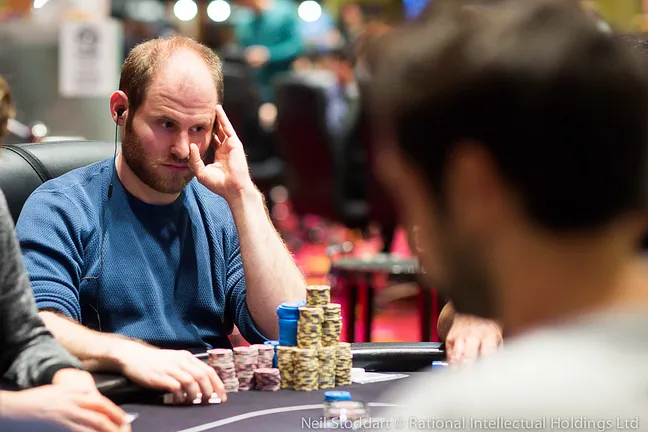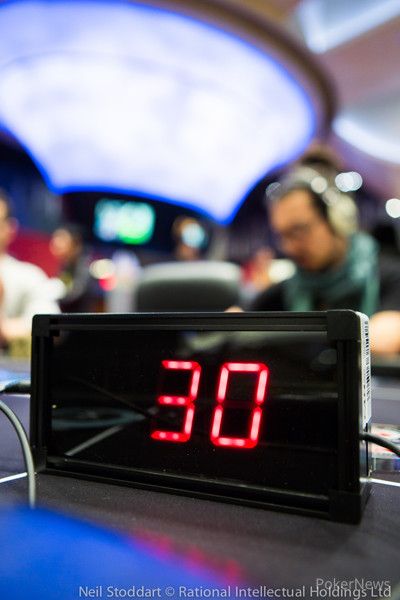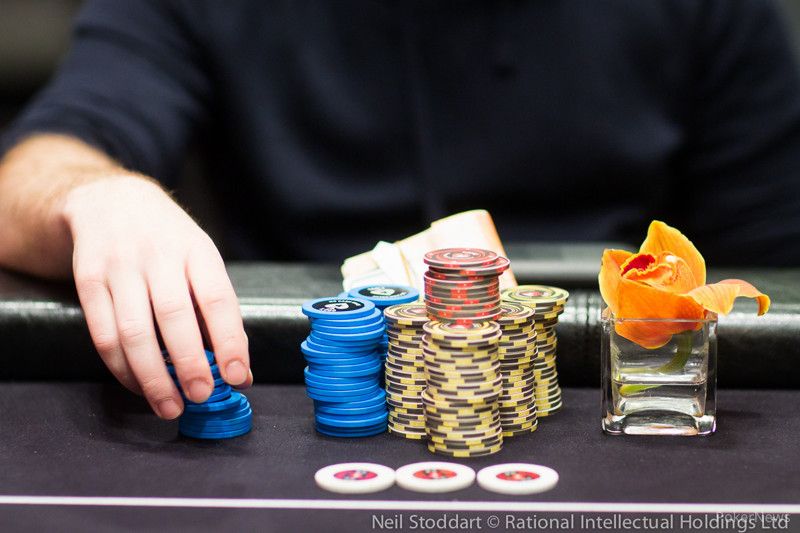Sam Greenwood Shares His Approach To the Shot Clock
![[user263659]](/img/avatars/avatar.svg)

Anyone who has spent any time playing online on PokerStars knows the quick bee-bee-bee-beep that reminds you that you’re on the clock with a decision to make. It’s a sound that’s immediately recognizable.
It’s a given that you only have so long to act when playing online poker and, in recent years, there’ve been calls to implement a timer for live poker as well to speed up play.
Earlier this year, PokerStars offered their very first live “shot clock” tournament at PokerStars Championship Bahamas, and this Super High Roller is in the same format. Though it’s missing the signature beeping noise, the live tournament is beginning to resemble its online counterpart.
“It’s taken them a couple tournaments to get out the kinks. The actual physical shot clocks here are awesome,” said Sam Greenwood as we caught up with him during a break. A large brick of a clock sits on each table with an unmissable “30” lit up in red.

Players have five seconds to act before the dealer starts the clock. If they don’t act before the timer hits zero, one of their three 30-second timebank chips will be used for extra time. When those run out, no decision can take longer than the 30-second clock.
“In these tournaments, I wish they’d replenish time chips. I wish they’d give you a little more time when you need the time. But these are minor things. Generally I like them a lot. They speed up the pace of play.”
Greenwood finished the day with the second-best stack yesterday. He’s clearly having no trouble adapting to the format, so we asked him how he approaches the shot clock. Is there some meta-level strategy involved in using the time chips?
“I’m mostly just making sure I don’t waste them in small or medium pots. In this tournament, we only have three chips. That’s part of the reason I kind of like replenishing time chips because then you can use them more strategically, but now we have three chips worth 30 seconds each for a three-day tournament. Just burning one to try to trick somebody… I’m just trying to make sure I don’t use them.”
There is some speculation that the shot clock is an inevitable progression for live poker and that it may be a matter a time before every tournament uses a clock to keep the action moving quickly. But Greenwood doesn’t see that as the best approach.
“I don’t think it should become the standard in all tournaments. I don’t think it should only be a high roller thing either.”
He went on to explain that in main events, where there are often a lot of people who are playing their first big live tournament having won a satellite or are taking a shot, they are already nervous and it’d be a lot to add the pressure of a shot clock, making it unappealing for them.

“I’ve played hundreds of thousands of hands live,” Greenwood said. “So I have my defaults pretty locked in and can act quickly. But for a lot of people, they can’t — even stuff like physically handling chips or reading bet sizes. I don’t think it should be a high-roller-only thing. It’s like any tournament format. I don’t think every tournament should become a turbo but turbos are a good addition to have on the schedule.”
It will be interesting to see how players choose to use their time chips as the tournament gets deeper. Greenwood will be one to watch as he started Day 2 with a great stack. Will players elect to save their chips for critical moments on the final table? Or will they use the chips for tough decisions in these middle stages so that they are more likely to make final table?
We wanted to know how much of an edge Greenwood felt the time chips would provide at the final table. Does a player with no extra time have poor chances? Do time chips provide a big advantage at that essential stage of the tournament?
“It’s not a big enough edge to make up for being the worst player,” he answered. “If I had a stack at the final that was worth maybe $500,000, I would probably be willing to pay one percent of that to get a time chip — to go from zero to one.”
It’s still early stages in the implementation of a live shot clock and there will almost certainly be tweaks to the format as organizers learn from each event, but there has been no resistance to the timer here in Macau. It seems to be here to stay.

